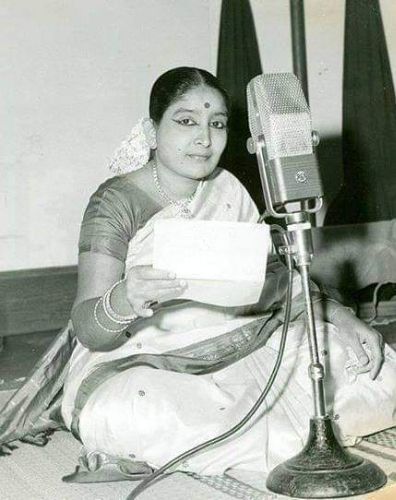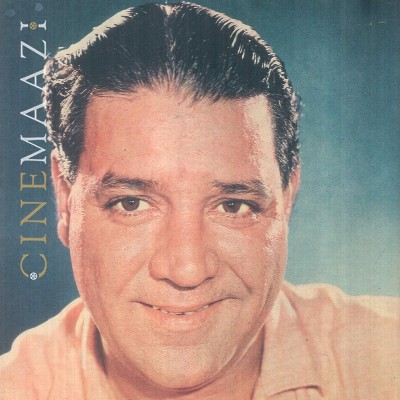Jikki

Subscribe to read full article
This section is for paid subscribers only. Our subscription is only $37/- for one full year.
You get unlimited access to all paid section and features on the website with this subscription.
Not ready for a full subscription?
You can access this article for $2 , and have it saved to your account for one year.
- Real Name: Pillavalu Gajapathi Krishnaveni
- Born: 3 November, 1935 (Chandragiri, Andhra Pradesh)
- Died: 16 August, 2004
- Primary Cinema: Telugu
- Parents: Rajakanthamma and Gajapathi Naidu
- Spouse: A M Rajah
Pillavalu Gajapathi Krishnaveni, better known as Jikki, was the nightingale of yesteryear South Indian cinema. A playback singer who rendered songs in Telugu, Tamil, Kannada, Malayalam, Hindi, and Sinhalese, among the many films she sang for are Mannina Magalu (1973 ), Vaatsalya(1965), Nanda Deepa (1962), Rathna Manjari (1962), Bhakta Kanakadasa (1960), Jagajyothi Basaveshwara (1959), Dharma Vijaya (1959), Krishna Garudi (1958), and Rathnagiri Rahasya (1957). Beginning her career in playback singing in the year 1948 with the Tamil film, Gnanasoundari, she sang approximately 10,000 songs in the course of her long and successful career that lasted over four decades and more. She was the first among the Telugu film singers to sing for a Hindi film when she recorded a song penned and composed by Gemini Studios for the Hindi version of the Telugu-Tamil folklore blockbuster Pathala Bhairavi (1951). When Raj Kapoor’s Hindi film Aah(1953) was remade in Telugu and Tamil, Jikki was chosen to render playback. She was honoured with the Ugadi Puraskaram by the Madras Telugu Academy and the Kalai Ma Mani by the Government of Tamil Nadu. She is memorable for her pleasantly melodious voiced that caressed, appealed, cajoled, and tantalised.
She was born on 3 November, 1935, a native of Chandragiri, near Tirupati. The family had moved to Chennai for a living. Even as her father struggled to sustain the family, little Jikki showed a noticeable talent for singing. This was not surprising, as her uncle Devaraja Naidu worked as music composer with the famous Kannada theatre personality and film pioneer, Gubbi Veeranna. This helped introduce the young and good-looking Jikki to the world of music and film.
Beginning her career as a child artiste, Jikki appeared in a minor role in the Telugu film Panthulamma (1943). This directorial of Gudavalli Ramabramham saw her feature as a young girl who learns a song from Lakshmirajyam, the musician-heroine.
Three years later, she featured in another memorable film - Mangalasoothram (1946). It was inspired by a Hollywood film. She drew attention for her musical prowess and her lilting voice even though she had not undergone classical training in music at the time. She made her full-fledged singing debut in Tamil cinema with the hit film Gnanasoundari (1948). The film was produced by the well-known art director-filmmaker F Nagoor and Joseph Thaliath Jr. She rendered the song Arul thaarum deva maathaavey aadhiyey inba jothi for the young girl (Baby Rajamani). It became a huge hit, as did the film. This was the turning point in her life. Thereafter, she began to sing regularly in Tamil and Telugu as well as Kannada and Malayalam films. With most of the Sinhalese films produced in South India in those times, she also sang for Sri Lankan films.
It was during this time that Jikki and P Leela were both in competition for the top slot in playback singing—incidentally, Jikki was in the lead. Together with P Leela, Jikki reigned supreme in the South Indian film world in the early part of the 1950s, till eventually P Susheela took centerstage from the late 1950s.
Jikki sang in hundreds of films, many of which became hits. Some of the best songs that she rendered during her career include Mayakkum maalai pozhudhe nee po po, Thulladha manamum thullum, Yeru pootti povaayae, Yaaradee nee mohini, the immortal duet Varaayi, Oorengum thaedinaen, Eruvaaka saagaloy, Pandhitlo pellavuthunnaadhi, and Lalalalee. While she worked with music composers such as S V Venkatraman, G Ramanathan, C R Subburaman, S M Subbaiah Naidu, S Hanumantha Rao, S Rajeswara Rao, Shankar-Jaikishan, C Ramchandra, and many more, she sang memorable duets with leading male singers namely A M Rajah, T M Soundararajan, Seerkazhi Govindarajan, Thiruchi Loganathan, Ghantasala, C S Jayaraman, S P Balasubramaniam,K J Yesudas, and others. She also rendered duets with female singers, most notably with P. Leela, as well as P A Periyanayaki, M L Vasanthakumari, T V Rathinam, P Susheela, and others.
Jikki married the successful playback singer and music composer A M Raja. They had successful collaborations together, and many songs rendered by Jikki under her husband's music direction were played for years by radio stations. The couple also sang together for live programmes abroad in countries such as USA, Malaysia and Singapore. However, her marriage was a difficult one and was apparently one of the reasons for the slide in her career. There was also the emergence of the new talent P Susheela who was fast gaining in popularity on the playback scene. After her husband Raja died in a tragic train accident in 1989, Jikki stopped singing for some time. She later came out of retirement and sang for Ilaiyaraja. She also went on to start a music troupe with her children.
Jikki was known to have been bold and forthright even as a young woman. On one occasion, she had rendered a song for a top film company; however, owing to some manipulation, her song was rejected. Jikki apparently went up to the people in charge and reproached them for their act. Another interesting aspect of her character emerges in an incident wherein she asked the producer Valampuri Somanathan to reduce her remuneration because he had given her the opportunity to sing five songs in a single film!
Jikki passed away on 16 August 2004 in Chennai.
References
https://chiloka.com/celebrity/p-g-krishnaveni-jikki
https://web.archive.org/web/20071103231943/http://www.thehindu.com/thehindu/fr/2004/08/20/stories/2004082002330400.htm
Image Courtesy: Images and Imprints of Indian Film Music












.jpg)



